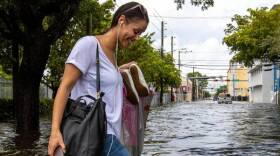-
Shortly after birth, babies are pricked in the heel so their blood can be tested for life-threatening conditions. States generally save leftover blood from those samples, and parents and privacy experts are concerned that information could be used without consent years later.
-
A blockbuster new study reveals a key factor explaining rates of upward mobility.
-
Sexual health clinics are scrambling to properly track, test, and treat hundreds of monkeypox patients. So far, it isn’t going well.
-
The 156 oysters were sampled from Biscayne Bay — which showed the highest number — along with Tampa Bay and Marco Island.
-
Isolation gowns are supposed to protect health care workers from splattered bodily fluids. But new studies suggest that too much liquid seeps through some disposable gowns, creating a risk of infection.
-
Flooded streets have become such a way of life in South Florida that most people wade right through the puddles. Sometimes, when the ponds are a bit deeper, they even pull out kayaks, paddleboards or wakeboards.
-
On Florida Roundup, how the pendulum of public health power has swung from local governments to the state. Also, why are fewer children not receiving regular vaccinations and a big settlement over pain pills.
-
Environmental justice advocates were circulating a petition for counties across Florida to use electric school buses at a weekend event to distribute free menstrual products and diapers in Tampa.
-
The research is clear that air exchange and filtration curb the spread of COVID and other diseases, but upgrading systems is expensive, and there is little federal authority over indoor air quality.
-
The country nearly eradicated this treatable sexually transmitted disease twice, only to see it come roaring back. The failure shows the weakness of a cash-strapped public health system.
Play Live Radio
Next Up:
0:00
0:00
Available On Air Stations










